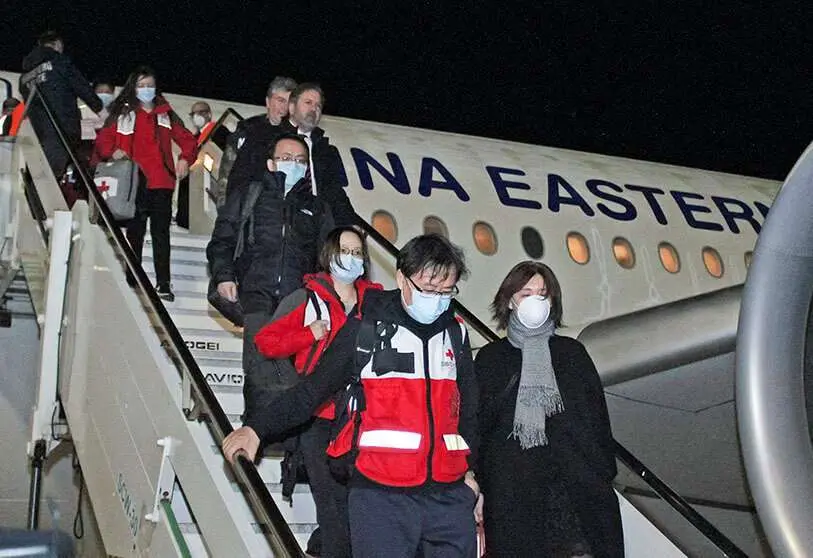Counter-offensive against the Chinese empathy operation

Neither free nor impromptu. The attacks by the United States and the United Kingdom against China's management of the COVID-19, together with the doubts about it sown by France, seem to respond to a fundamental objective: to counteract China's successful diplomatic offensive, which has culminated in the progressive decontamination of the city of Wuhan and the progressive reopening of economic and social activities. The regime presided over by Xi Jinping had managed in barely a month to turn around the widespread perception around the world that its management of the pandemic had been catastrophic, both because it had concealed the origin of the triggering outbreak and because it had concealed its spread and lethality.
Through careful operations of empathy, through donations of health material and support from medical personnel, in addition to local aid from Chinese communities living in countries such as Italy or Spain, what at the beginning of the pandemic was suspicion and distrust, has been exchanged for sympathy and a good image, contrasting them above all with the feelings aroused and projected by the president of the United States, Donald Trump, which are quite far from moving towards unwavering support.
Obviously, the pandemic has not stopped the war for world supremacy waged by both superpowers. Within that contest, China is overtaking the United States in what is called soft power, that is, in the greater understanding, acceptance and even incorporation of Chinese uses and culture by European or Latin American societies mainly. In fact, one of the main debates raised by the pandemic is whether this type of plague is best fought with an authoritarian but efficient system, or with a democracy and its freedoms, a struggle that in not a few forums is in favour of the former.
Trump's accusation that Beijing had "disguised" the seriousness of the epidemic in its early days has been accompanied by the suspension of the U.S. contribution to the World Health Organization (WHO), calling it "chinocentric". Its director general, the Ethiopian Tedros Adhanom Ghebreyesus, certainly acceded to the position thanks to the decisive support of Xi Jinping, and to the pressures that the Chinese leader exerted to facilitate his election, although such a vicissitude, typical of any struggle for an international poltrona, is not a reason to disqualify him or the organization he heads in the current circumstances.
Trump has immediately found the support of the United Kingdom, whose Foreign Minister and now acting Prime Minister, Dominic Raab, called on China to answer many "difficult questions", especially how the virus appeared and why its spread was not contained.
French President Emmanuel Macron, in an interview with the Financial Times, also added to the Anglo-American doubts. The French president refused to compare the transparency and freedom of information in the major European countries - he expressly mentioned France, Germany and Italy - with the situation in China or Russia, before pointing out that "there are obviously things that happened [in China] that we know nothing about.
These doubts are fed by very relevant testimonies or opinions, such as those offered on the French television channel CNews by the Nobel Prize winner and discoverer of the immunodeficiency virus Luc Montaigner, himself with a long experience as a researcher living in China. Emphasizing that he does not accuse anyone, but rather sticks to the facts, the French biologist explains that the virus could have gotten out of control when the laboratory in Wuhan was trying to find a vaccine against AIDS. He explained that the process could have occurred by installing a small sequence of coronaviruses in a larger sequence of HIV.
It seems very clear that such claims by a virologist of Montaigner's prestige could only be refuted with very detailed explanations, something that China has so far failed to offer, otherwise limiting itself to letting speculation about the market in wild animals, including bats, in which the pandemic was allegedly triggered.
Returning to the axis of the counter-offensive, we must also note the new accusations by the US State Department that China has proceeded to carry out low-intensity underground nuclear tests. The Wall Street Journal has revealed that these tests were carried out in the Lop Nur centre, where spy satellites have detected important excavation works and explosive containment chambers. If confirmed, Beijing would have violated the 1996 Comprehensive Nuclear-Test-Ban Treaty (CTBT), which would be an additional reason for mistrust.
In short, Washington already had too many indicators pointing to the emotional distance from European and Latin American societies, and that their willingness to accept China's primacy was growing by leaps and bounds. In its strategy, not reacting would be as much as accepting the definitive surrender of what until now was called the West.

